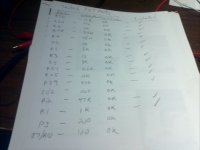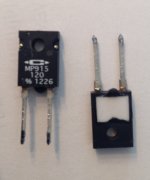If there is nothing obvious then you could perform a gain test on the amps to see which one is off. IIRC the F5t has 22db gain. So feed the amps a 1V rms 60hz signal and see if you have around 13V rms out. Doing it this way will allow you to use a DMM if you don't have a scope.
That's a cool little test. I have a scope, but don't have the amp at my place. Any respectable test CD will have a 1k tone.
I use my laptop and tone generator software. There's a ton of free tone gen programs out there. I think I have three different ones...
no need for rms
relative measurement of input/output is what's relevant ....... so - just ratio
most modern DVMs are good up to 1KHz
say that 440Hz is ..... good for
relative measurement of input/output is what's relevant ....... so - just ratio
most modern DVMs are good up to 1KHz
say that 440Hz is ..... good for
Folks:
I reported bad information to Vince; the rebuilt amp is in fact noticeably quieter than its monoblock twin, not louder. I cannot explain my mistake.
In any event, I have tried adjusting the balance on my preamp to determine just how much quieter the rebuilt amp is, and the answer seems to be in the range of 6 to 7 db.
The amps are F5T V3 monoblocks, built in the Store's HiFi2000 5U enclosures.
Here are the recorded readings:
Untouched Amp
Drop across source resistors on P side: 0.343 VDC
Drop across source resistors on N side: 0.354 VDC
DC offset: 1.5 mV
Readings at PS: -44.9 VDC, +44.6 VDC
Rebuilt Amp
Drop across source resistors on P side: 0.337 VDC
Drop across source resistors on N side: 0.361 VDC
DC offset: 2.0 mV
Readings at PS: -44.6 VDC, +44.9 VDC
The average drop across the source resistors on the untouched amp is 0.3485 VDC and the average drop on the rebuilt amp is 0.349 VDC.
Your thoughts?
Regards,
Scott
I reported bad information to Vince; the rebuilt amp is in fact noticeably quieter than its monoblock twin, not louder. I cannot explain my mistake.
In any event, I have tried adjusting the balance on my preamp to determine just how much quieter the rebuilt amp is, and the answer seems to be in the range of 6 to 7 db.
The amps are F5T V3 monoblocks, built in the Store's HiFi2000 5U enclosures.
Here are the recorded readings:
Untouched Amp
Drop across source resistors on P side: 0.343 VDC
Drop across source resistors on N side: 0.354 VDC
DC offset: 1.5 mV
Readings at PS: -44.9 VDC, +44.6 VDC
Rebuilt Amp
Drop across source resistors on P side: 0.337 VDC
Drop across source resistors on N side: 0.361 VDC
DC offset: 2.0 mV
Readings at PS: -44.6 VDC, +44.9 VDC
The average drop across the source resistors on the untouched amp is 0.3485 VDC and the average drop on the rebuilt amp is 0.349 VDC.
Your thoughts?
Regards,
Scott
those DC values are all in same (tight) ballpark
reason for different gain - resistors/values in feedback net
something is probably damaged
reason for different gain - resistors/values in feedback net
something is probably damaged
Tested the original jfets. The 2sk170 is 9.95 and 2sj74 is 10.07mA. The jfets I put in are tighter tolerance.
Feed back network is r7-10 and r3 and 4. I doubt I reversed them but its possible.
I just took a look at my note. I took a reading of r4 and wrote down the number because it seemed off. It was 15 ohm, not 10 ohm. Just noticed that. 🙄
That could be the issue.
Vince
Feed back network is r7-10 and r3 and 4. I doubt I reversed them but its possible.
I just took a look at my note. I took a reading of r4 and wrote down the number because it seemed off. It was 15 ohm, not 10 ohm. Just noticed that. 🙄
That could be the issue.
Vince
Folks:
Here's something odd. In the process of repairing my downed F5T monoblock, I took a closer look at the other (properly working) amp. Instead of using 3 watt 220R resistors at R7, R8, R9 and R10 on the front end board, I was using two MP915 120 ohm power resistors, rated at 15 watts, which were supplied in Buzzforb's first F5T group buy. I had small clip-on heatsinks on both. Neither resistor reads 120ohms; one is 230R and the other is 247R. Both have a dimple between the legs (insert joke here); see the photo.
Has anyone seen this before? I will order replacement MP915 resistors from mouser, unless anyone can suggest a better component or source. Naturally, I'd like to avoid going through this in the future.
Regards,
Scott
Here's something odd. In the process of repairing my downed F5T monoblock, I took a closer look at the other (properly working) amp. Instead of using 3 watt 220R resistors at R7, R8, R9 and R10 on the front end board, I was using two MP915 120 ohm power resistors, rated at 15 watts, which were supplied in Buzzforb's first F5T group buy. I had small clip-on heatsinks on both. Neither resistor reads 120ohms; one is 230R and the other is 247R. Both have a dimple between the legs (insert joke here); see the photo.
Has anyone seen this before? I will order replacement MP915 resistors from mouser, unless anyone can suggest a better component or source. Naturally, I'd like to avoid going through this in the future.
Regards,
Scott
Attachments
Hi Scott,
I was wondering if it were possible the resistors were de-rated, for lack of a better term, if the heatsink wasnt properly touching the resistor body? For example, with heatsink its rated at 15w, but without the heat sink they are only good to 2-3w.
Some of these will work, and some are 1% for under a buck. Vishey/Dale are nice.
RS02B220R0FS70 Vishay / Dale | Mouser
Wirewound Resistors - Through Hole | Mouser
I was wondering if it were possible the resistors were de-rated, for lack of a better term, if the heatsink wasnt properly touching the resistor body? For example, with heatsink its rated at 15w, but without the heat sink they are only good to 2-3w.
Some of these will work, and some are 1% for under a buck. Vishey/Dale are nice.
RS02B220R0FS70 Vishay / Dale | Mouser
Wirewound Resistors - Through Hole | Mouser
Last edited:
Just checked the data sheet for the MP915 120 ohm power resistors. Only rated to 1.5w without heat sink.
But still. Is it possible?
I don't think I saw goop.
But still. Is it possible?
I don't think I saw goop.
Last edited:
Huh... Just saw this --
(Googles it)
...Orders one immediately.
😎😎😎
Which one did you get? Most of them seem affordable to say the least.
Russellc
The P4400.
It hasn't arrived yet, but am really looking forward to it!
That is what I have is the P4400 and mine has got to be close to 10 yrs old now and still works like a champ. Its definitely a neat and useful gadget.
Folks:
Here's something odd. In the process of repairing my downed F5T monoblock, I took a closer look at the other (properly working) amp. Instead of using 3 watt 220R resistors at R7, R8, R9 and R10 on the front end board, I was using two MP915 120 ohm power resistors, rated at 15 watts, which were supplied in Buzzforb's first F5T group buy. I had small clip-on heatsinks on both. Neither resistor reads 120ohms; one is 230R and the other is 247R. Both have a dimple between the legs (insert joke here); see the photo.
Has anyone seen this before? I will order replacement MP915 resistors from mouser, unless anyone can suggest a better component or source. Naturally, I'd like to avoid going through this in the future.
Regards,
Scott
yep that explains that. the higher value in feedback resistance will give you a higher gain. Therefore it will make that amp sound louder than the one you rebuilt.
Not sure how that happened that it melted the resistors though. There is some math someone posted here about how much current runs through those feedback resistors, Perhaps someone remembers it ?
Anyways in my build I deliberately put 200R resistors in the feedback loop instead of the spec'd 110R in order to give 6dB more gain. I've had no problems with the resistor melting. Its been running continously for 8 months now with 50V rails
P=IV=I²R=V²/R
well yes of course its based off Ohms law.....
Just can't remember how to arrive at the V in normal operation in that loop (R7 through R10)
- Status
- Not open for further replies.
- Home
- Amplifiers
- Pass Labs
- F5 Turbo 3 Failure

